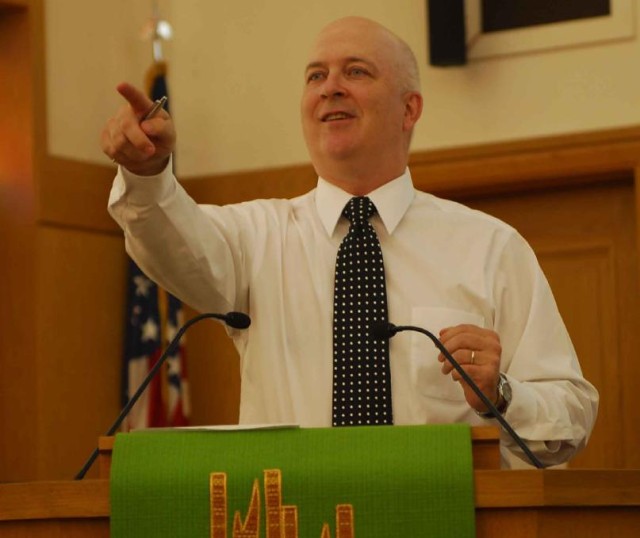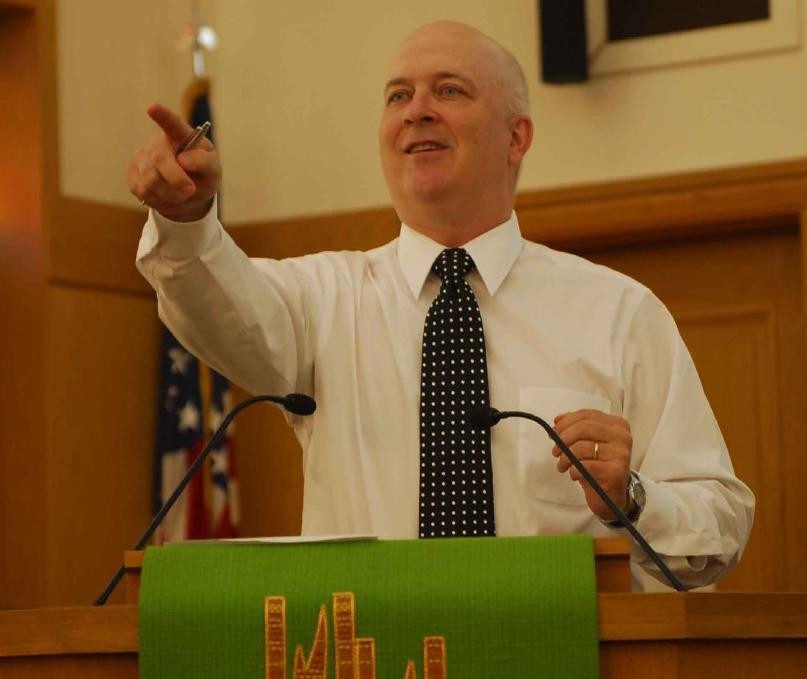In one of his eight deployments, he was in the heat of battle in Iraq. With the blink of an eye, a nearby Soldier was injured and reA,A!acting instantly, he ran to the Soldier's aid. He sees the grave pain the Soldier is going through and supports the Soldier staying by his side offering words of comfort as he is swiftly transported to an aid station. He only parts ways when the Soldier is moved to a hospital to be taken care of.
In a quiet office space with thick religious books and files, Lt. Col. Jeffrey L. Zust, the new 19th Expeditionary Sustainment ComA,A!mand command chaplain, told this story that best sums up both the difficulty and joy of working as a command chaplain.
When Zust returned to the U.S. from that deployment, he visited the wounded SolA,A!dier who was still hospitalized and his famA,A!ily. He said he worried how the wounded Soldier would be after the Soldier lost both his legs as a result of the attack. Even in light of such tragedy, this anecdote is not entirely heartbreaking.
About a year later he recalls, "I actually got to run with the Soldier." The Soldier received artificial legs. Zust smiles as he reminisces again, "During (physical trainA,A!ing), he saw me and caught me from behind when we went out running together." Such is the duty of the command chaplain. He was there to comfort the wounded Soldier and his family in moments of despair and pain, but he was also there to celebrate and support the joyful moments of triumph and hope. Such is the job for the chaplain.
The mission of the chaplain is "to provide for the spiritual care of all the Soldiers in the command by advising the commander on any aspect of religion, morale, morals or ethics." In other words, the chaplain serves the command through three main methods: nurture the living; care for the wounded; and honor the dead. The chaplain nurA,A!tures the living by caring, looking out for the welfare of Soldiers through individual counseling as well as performing baptisms, weddings, and public worship. The chapA,A!lain cares for the wounded through individA,A!ual counseling for those Soldiers coming out of deployment who are going through mental stress or Soldiers experiencing perA,A!sonal crisis.
They are also there to listen to Soldiers goA,A!ing through suicidal issues. They link SolA,A!diers with the necessary resources in caring for them. Lastly, the chaplain honors the dead through prayers, ceremonies and euA,A!logies.
Having completed his religious degree from the Lutheran Northwestern Seminary, St. Paul, Minn., Zust is an Evangelical LuA,A!theran, meaning he cooperates with other Christian faiths. But the chaplain section is more than about religion and religious acA,A!tivities.
"Religion is a personal resource, but it's not a qualification to meet with the chapA,A!lain," he said. "If a Soldier comes and talks to me, it's about helping the Soldier to use his or her religion or even their non reliA,A!gion to work through their problems." For Soldiers who find it difficult to relate to a religion, they can show up and speak to a chaplain Soldier just to let out his or her troubles and worries. Soldiers are allowed privileged communication which means whatever is said during counseling remains private.
Zust understands what it's like to be deA,A!ployed. He understands what it's like to be away from family. While he may not be going through the exact same experience, he can help not only by drawing from his own experience, but also using faith as a resource to those who are in need.
Now in his twenty third year of service in the Army, he aims to improve the compreA,A!hensive fitness of the Soldiers by improvA,A!ing the emotional, spiritual, and social connectivity among Soldiers because "the more connected we are, the more resilient when bad things happen, and I would like to have done that by helping them look at their spiritual roots, seeing them as a reA,A!source of strength and growth," he said.
Secondly, the new command chaplain plans to help those Soldiers in crisis such as victims of sexual assault or ones with suicidal issues normalize back into their lives.
For Soldiers returning from deployment, Zust said the Warrior's Huddles are a valuA,A!able forum. He intends to actively take care of the Soldiers' families with the family life chaplain, integrating spouses and children through various activities and programs. Zust's last goal is to connect with the local Daegu community, to form a constructive relationship for each other.


Social Sharing